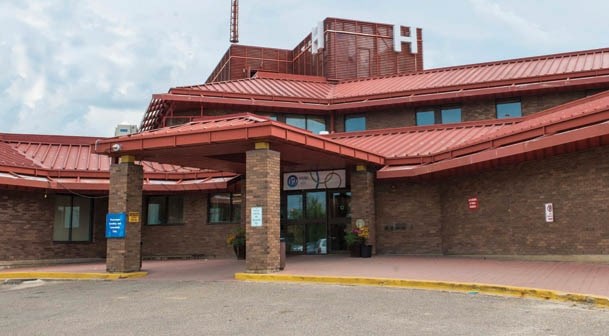LAKELAND - Hospitals in the Lakeland region of Alberta are highly dependent on private agency nurses according to documents from Alberta Health Services and Covenant Health.
As first reported by The Progress Report, AHS has spent a projected $330 million on agency nurses since 2022. Agency nurses are employed by private companies and travel to fill short and long term contracts of at least six weeks for public healthcare providers.
Covenant Health spent a projected $18.9 million since fiscal 21/22, with nearly half of that being spent in 23/24 alone.
Bonnyville has highest number of travel nurses
The Bonnyville Health Care Centre is operated by Covenant Health and had 117 registered nurse (RN) placements and three licensed practical nurse (LPN) placements in the last three years – more placements than any other Covenant Health site.
According to Shelly Franklin, the Site Administrator for Bonnyville Health Care Centre, most of the agency placements were contracts of at least three months.
She said choosing to have contracts of at least three months for Bonnyville was part of being good stewards of their resources, as was the decision to combine the two acute care floors.
“If we just left what we had, Acute Care One and Acute Care Two, we would have needed more contract nurses. So because I have that local autonomy and support from Covenant, we came together as a leadership group and we said, ‘How can we still provide the services that the community is needing and wanting without cutting or having any disruptions, but be able to have good financial stewardship with needing less contract nurses?’ And that's why, when you come to the Bonnyville Health Center, obstetrics and med surg is on the same floor.”
The amount spent on agency nursing in Bonnyville is projected to decrease this year. Bonnyville Health Care Centre spent $4.7 million in 2023/24 and is projecting $3.2 million on contract nursing in 2024/25.
Franklin said they do offer overtime for their staff, “but there also came a critical point that we recognized for retention and long-term commitment we needed to create a balance and bring these contract nurses in. Because [nurses] also deserve time off, they also deserve vacation, and they also deserve a workplace that they feel that there's some flexibility for them.”
She emphasized that they do have an “absolutely phenomenal core group” of nurses who have repeatedly stepped up for Covenant Health and for the community.
Staffing for rural nurses ongoing challenge
Covenant Health also used agency nurses at their hospitals in Castor, Killam, Vegreville, Camrose, Lethbridge, Mundare, and Trochu.
Camrose had the second highest number of placements with 47 RNs and 14 LPNs since April 2021.
According to Brenda Poole, the Senior Director of Operations Rural/Acute for Covenant Health, agency nurses are used on an as-needed basis only. She said they started to see an uptick in vacancies post-COVID, but challenges in staffing rural nurses tends to be somewhat cyclical.
“We fill positions, and often they come, they have great experiences, but they would like to go on and work in an urban center and do something different - go to Critical Care or a service that we don't offer,” said Poole.
According to Poole, they have had some agency nurses who came back as permanent employees after their contracts were done, but because of how the agency contracts are structured, they weren’t able to immediately go into those roles.
She said different agencies have different stipulations, but usually it’s six months or a year after a placement that they can’t hire the agency nurse without an additional fee for the nurse to break their contract with the agency.
“We were never in a position to actively recruit them at all. We were grateful for them to come and provide the support, but they were the ones that would approach the site administrator or a manager to say, ‘I really like working here. What would I need to do?’,” said Poole.
Poole said Covenant Health has had and continues to have great partnerships with the agencies providing contract nurses, so when a nurse does approach them about a permanent position “there's always a discussion, a respectful discussion, and we always encourage the agency nurse to go back to their agency and have the conversation around what they would like to do.”
According to the Collective Agreement with the United Nurses of Alberta, which expired in March 2024, the starting wage for an RN is $39.21/hour. Contract nurses are not part of the union and are paid according to the rates set by their individual agencies, which were not included in the documents provided by Covenant Health.
Agencies can bill healthcare providers for travel, accommodation, and incidentals including meals and parking costs. Those costs are included in the overall budget for contract nursing.
AHS hospitals use contract nurses
According to documents shared by The Progress Report with Lakeland This Week, AHS hospitals and continuing care centres in the Lakeland (Athabasca, Barrhead, Boyle, Cold Lake, Elk Point, Lac La Biche, Smoky Lake, St. Paul, Two Hills, Vegreville, and Westlock) had 287 Registered Nurse placements, 155 Licensed Practical Nurse placements, and 251 Health Care Aide placements in the last three years.
According to AHS, they are working “to reduce our reliance on agency nursing and ensure work is done by employees where appropriate. Contracted staff are being used only when we have exhausted other options with existing staff.”
The FOIP response notes agency nursing placements province-wide have decreased 46 per cent since September and October 2023.
While this is broadly true, the documents show there are still significant gaps being filled by agency nurses at AHS hospitals in the Lakeland, especially in Lac La Biche, St. Paul, and Two Hills.
Efforts to speak with AHS about contract nursing at their hospitals and continuing care centres in the Lakeland are ongoing.



